[key_takeaways title="Steps to selling crypto in the Netherlands:"]
- Select a platform: Consider your requirements and select a platform that suits your needs.
- Create and verify an account: Create an account on the platform and complete the KYC verification process to gain full access.
- Deposit crypto: Deposit crypto to the platform, ensuring the network and wallet address your exchange displays match your wallet.
- Sell crypto: Search for a trading pair denominated in your selling asset, decide how much to sell, set a price, and confirm the order to complete your crypto sale.
[/key_takeaways]
Learning how to sell crypto in the Netherlands can be challenging. Many platforms and methods exist, but only some are worthwhile.
This guide provides a step-by-step breakdown of how to sell crypto in the Netherlands, highlights the best platforms, discusses tax implications, and explores crypto regulations. Let's get started.
What are the tax implications for selling crypto in the Netherlands?
Crypto taxes in the Netherlands could be more straightforward and are very different from most other countries. The region does not levy capital gains tax, but you'll still be charged tax based on the value of your assets.
Regardless of whether you've sold any crypto, you must declare the value of your portfolio on January 1st yearly. As such, while you do not pay tax on your crypto sales, you pay based on your overall asset value.
Taxes in the Netherlands are divided into boxes, with crypto earned from crypto mining or as income from a job falling into the first box and fictitious returns from investments falling into the third box.
The tax rate varies based on your taxable income or your portfolio size. The following rates apply to Dutch taxpayers:
| Tax Box 1 (Income) | Tax Rate | Tax Box 3 (Investment Portfolio Size) | Tax Rate |
| Up to €35,472 | 9.42% | Up to €50,651 | 1.818% |
| €35,473 to €69,398 | 37.07% | €50,651 to €962,351 | 4.366% |
| €69,399+ | 49.50% | €962,351 | 5.53% |
How is crypto regulated in the Netherlands?
Private citizens in the Netherlands are free to buy, sell, and trade cryptocurrency without restriction.
Although the Netherlands states that unbacked cryptos are unsuitable for money due to price volatility, it is considered one of the most crypto-friendly countries.
Citizens of the Netherlands can even freely sell crypto without paying crypto capital gains tax.
Despite private investors having freedom, crypto service providers must register with the De Nederlandsche Bank (DNB) to operate legally. Companies that do not register with DNB can be forced to cease operations.

Crypto providers must also follow Anti-Money Laundering and Anti-Terrorist Financing regulations.
The Netherlands must also comply with EU regulations surrounding cryptocurrency. In 2023, the EU ushered in the Markets in Crypto Assets Regulation (MiCAR) legislation, which required enhanced consumer protection.
Under these rules, service providers cannot offer overly risky products and must compensate customers if funds are lost to a platform hack.
- The De Nederlandsche Bank (DNB) regulates crypto in the Netherlands.
- Private citizens can freely buy, sell, and trade crypto.
- Service providers must register with the DNB or could face closure.
How to sell crypto in the Netherlands (step-by-step)
Selling cryptocurrency in the Netherlands is straightforward, and any crypto investor can do it.
However, you can easily overlook factors like whether a popular platform supports EUR withdrawals, so it's essential to carefully consider your requirements before conducting a sale.
Step 1: Choose a platform
Before selling crypto, you must choose a platform to conduct the crypto transactions. You should consider how you want to withdraw your money, which assets the platform supports, and what fees will be charged.
The best crypto exchanges in the Netherlands are typically great for selling crypto in the region, but all-in-one platforms can yield more value.
- You can sell crypto in person and by using an exchange or P2P platform.
- The fees and features of each platform will vary greatly.
- Consider your requirements before selecting a platform.
Step 2: Deposit funds
After selecting a platform to conduct the sale, you must verify your account and deposit funds. You can use the 'Deposit' button to find your deposit address.
Then, send the crypto you want to sell from your wallet to the exchange and wait for the transfer to be confirmed.
- The deposit process can take up to 2 hours to complete.
- You must deposit crypto using the correct network.
- You will permanently lose funds sent to the incorrect address.
Step 3: Sell crypto
Once your deposit has arrived and is confirmed, you can sell crypto. Search for a pair denominated in the asset you want to sell, enter the price, and how much to cash out.
Before confirming the sale, you should double-check any fees and note whether the transaction is related to your income tax or investments.
- Always check fees before selling to ensure you're getting a fair value.
- It can be worth considering the broader market conditions to determine the right time to sell.
- Withdraw the funds after your sale for better security.
An all-in-one solution for instantly selling crypto - discover swissmoney!
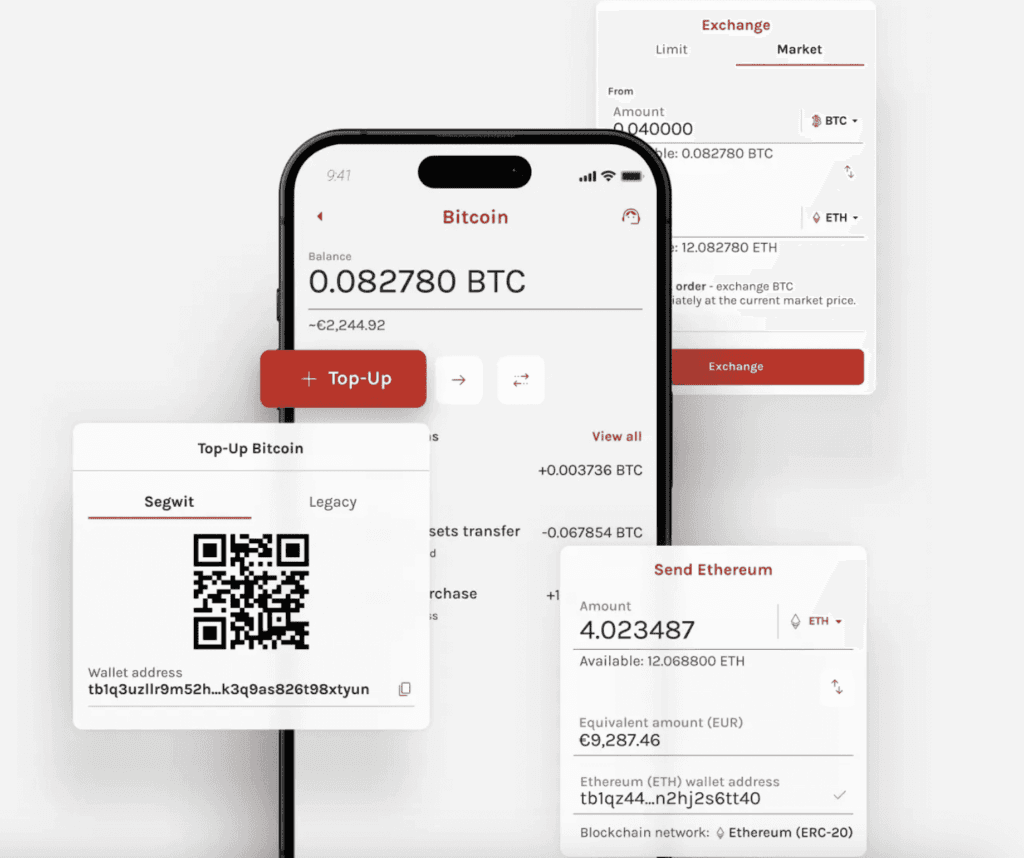
While exchanges are suitable for selling crypto, using an all-in-one platform can yield greater convenience.
swissmoney grants users total control over their fiat and crypto holdings while enabling people to sell, trade, or buy crypto in the Netherlands.
The financial services provider holds a license with the Swiss regulator FINMA, highlighting its trustworthiness. However, the platform boasts much more:
- Near-instant onboarding: One of the most significant advantages of using swissmoney is the platform's near-instant onboarding process. For 90% of users, onboarding is completed automatically in minutes, meaning you can sell crypto quicker with swissmoney.
- IBAN accounts: Once you sell your crypto, you can store it in swissmoney's EUR, CHF, GBP, and USD IBAN accounts. You can send or receive international payments and set up direct debits to pay rent and bills. Therefore, swissmoney is an excellent choice for people who frequently travel or send cross-border payments.
- Crypto debit card: Instead of selling crypto for fiat and withdrawing it to a bank account, you can fund a swissmoney debit card with crypto on the platform and use it to cover spending in everyday establishments like restaurants and shops. Moreover, the swissmoney card boasts no hard limits, making it ideal for large purchases like buying a new car.
- In-built wallet: Another convenient aspect of swissmoney is the platform's in-built crypto wallets. You can deposit several assets into swissmoney that can be sent, sold, or traded, meaning you don't necessarily require an external crypto wallet.
How to sell crypto in the Netherlands with swissmoney
While crypto exchanges are a popular way for people to sell crypto, they can have lengthy onboarding times or subpar fiat management tools.
However, the all-in-one platform swissmoney solves these issues and makes it easy for anyone to sell crypto in the Netherlands.
Step 1: Create a swissmoney account
Before depositing funds, create and verify a swissmoney account. You must provide your name, email address, and password.
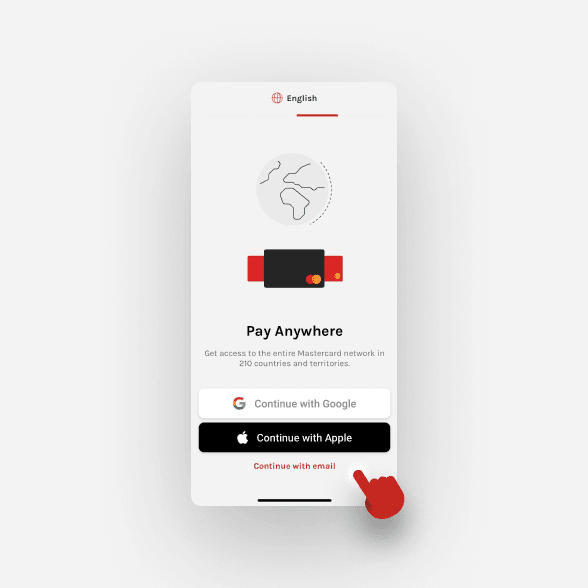
Then, you'll need to confirm your email, input a phone number, and complete the Know-Your-Customer (KYC) verification process via mobile.
- You can create a swissmoney account and verify it later.
- swissmoney boasts speedy onboarding, with most accounts ready in minutes.
- As a FINMA-licensed platform, your details are safe with swissmoney.
Step 2: Add crypto wallets
After creating your swissmoney account, you must add wallets for whatever fiat and cryptocurrencies you want to deposit.
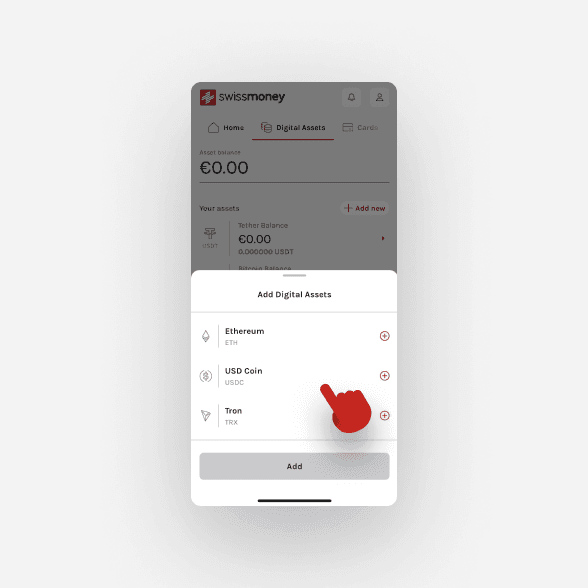
By default, EUR is added, but you can add GBP, USD, CHF, and AED. For crypto, you must press 'Add crypto currency,' select a wallet, and press 'Add new' to add a cryptocurrency wallet to your swissmoney account.
- As you only add the wallets you need, managing crypto on swissmoney is easy.
- You can add BTC, ETH, TRX, USDT, and USDC wallets to swissmoney.
- You can alter the position of your currency wallets for convenience.
Step 3: Deposit crypto to swissmoney
You can initiate the deposit process once you've added the relevant crypto wallets. Click on the asset you want to sell, and swissmoney will display a wallet address and its network.
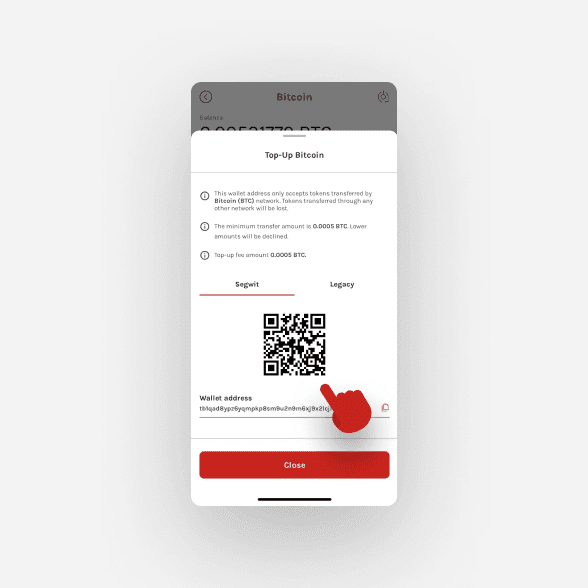
Copy this address into your crypto wallet, enter the amount you wish to send, and confirm the transaction.
- Depending on the asset and network fee applied to the transaction, a deposit can be processed in a few minutes to a couple of hours.
- Ensure you only send crypto on the correct network; otherwise, it will be lost.
- It can be worth timing your transactions when network fees are low.
Step 4: Sell crypto on swissmoney
After the deposit has arrived in your account, you're ready to use swissmoney to sell crypto in the Netherlands.
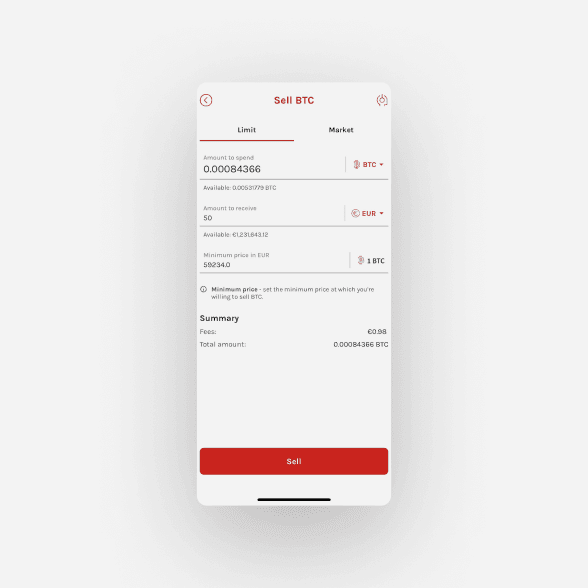
Click on the asset you want to sell, press the 'Trade' button, then select 'Crypto to fiat conversion.' Lastly, input the amount of crypto you want to spend and the price you want to sell, then check the fees and press the 'Sell' button to confirm the order.
- swissmoney displays fees when on the sale screen.
- You can sell crypto for fiat or swap it for another cryptocurrency.
- After selling crypto, you can store the fiat in a swissmoney IBAN account or debit card for easy spending.
What are some alternative ways to sell crypto in the Netherlands?
While using a crypto exchange or an all-in-one platform like swissmoney are some of the most common ways to sell crypto in the Netherlands, several other methods are available, each boasting unique pros and cons.
Peer-to-peer platforms
Peer-to-peer (P2P) platforms are excellent for selling crypto as they allow you to dictate the terms of a sale better than an exchange.
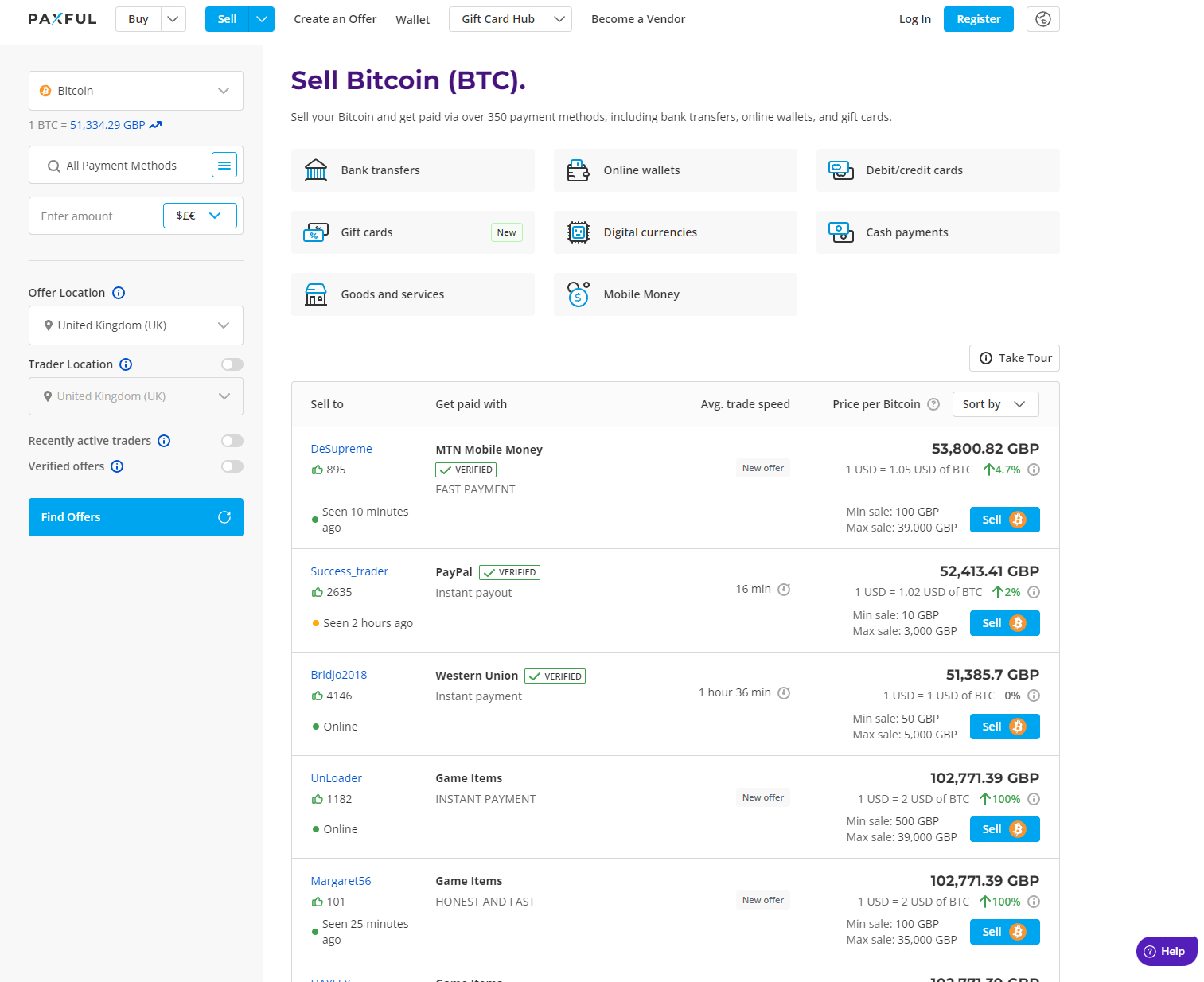
You control cashout currency, payment method, and who you sell to, while the platform provides an escrow service to keep buyers and sellers.
Moreover, KYC verification is not strictly required on P2P platforms like Paxful.
Pros:
- No ID verification is needed.
- You have complete control.
- The platform provides an escrow service.
Cons:
- Trades can be time-consuming to set up.
- You have to wait for a buyer to find your offer.
Bitcoin ATMs
If you want to trade offline and avoid third-party platforms, consider using a Bitcoin ATM. Despite the name, some crypto ATMs support several cryptocurrencies, significantly increasing the service's flexibility.
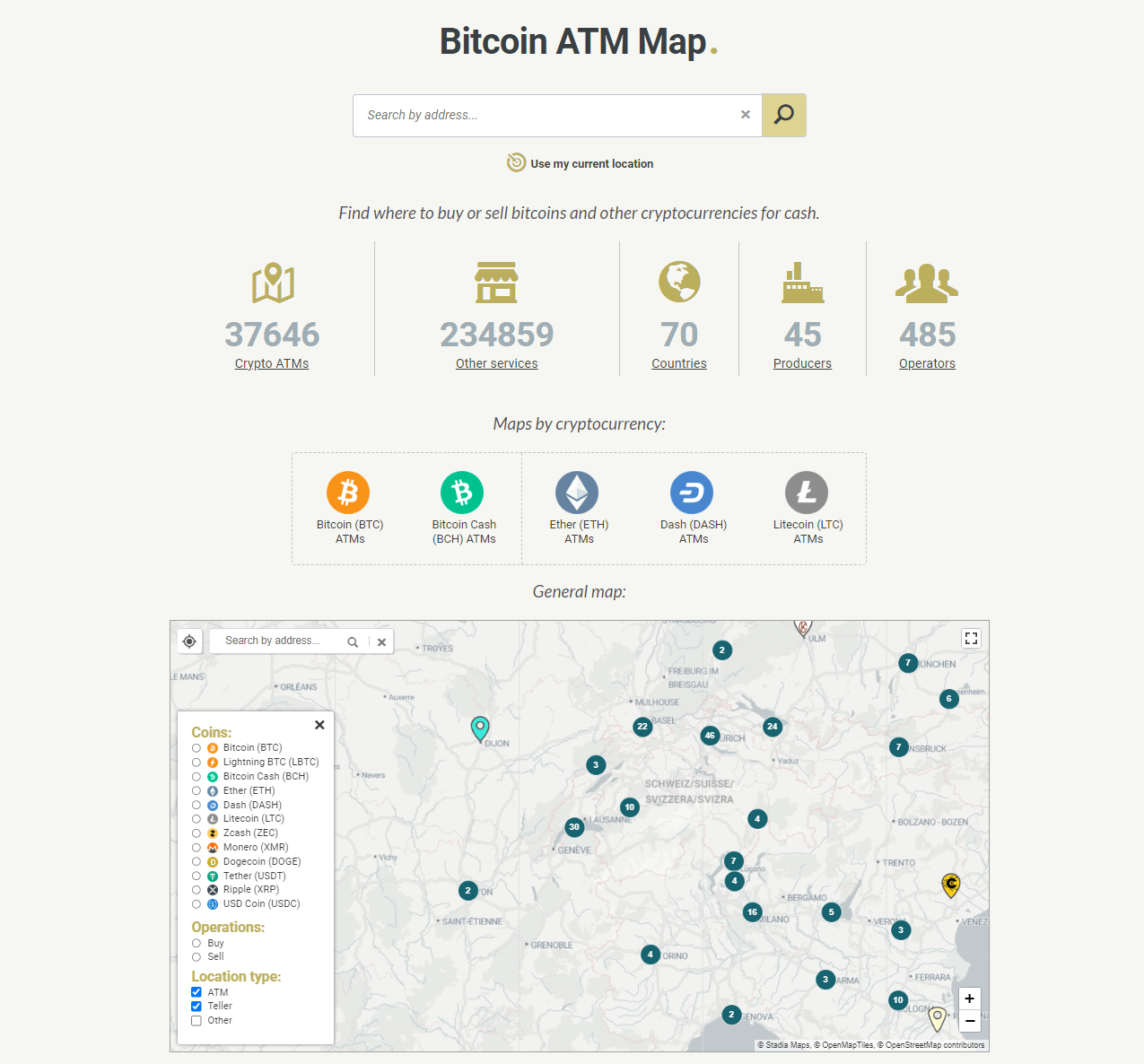
All you need to do is visit an ATM and send funds to the provided address, and you'll be paid in fiat.
Pros:
- Convenient cashouts.
- Straightforward sale process.
Cons:
- Only supports select assets.
- High fees.
OTC Desk
An Over-The-Counter (OTC) trading desk is another way you can sell cryptocurrency. Ideal for high-volume transactions, you can set up a fixed deal with the OTC desk so they can buy a certain amount of crypto at a specific price. Unlike crypto exchanges, the deal is fixed and is not affected by market conditions.
Pros:
- Offers from OTC desks are binding once made.
- Prices are fixed, meaning market conditions don't impact the transaction.
Cons:
- OTC desks are only suitable for large transactions.
- You could pay a higher fee for using an OTC desk versus an exchange. You could pay a higher fee for using an OTC desk versus an exchange.

The most popular platforms to sell crypto in the Netherlands
Now that we've discussed how to sell crypto in the Netherlands, it's time we highlight some of the most popular platforms.
1. Bitavo
Bitavo is one of the few crypto exchanges native to the Netherlands. The platform allows you to sell over 250 cryptocurrencies and offers staking services. Trading fees on Bitavo range from 0.15% to 0.25%, depending on the asset and the quantity you are selling.
2. Coinbase
Coinbase is one of the world's most popular exchanges. The platform offers 248 digital assets and provides beginner and advanced modes, tailoring the platform to all users. Trading fees on Coinbase are 0.40% / 0.60% (maker/taker), making the platform more costly than most others.
3. Paxful
Paxful is a leading P2P trading platform supporting many countries and cryptocurrencies. Instead of trading with the platform, Paxful directly pairs buyers and sellers. Unlike exchanges, Paxful supports obscure payment methods like gift cards and offers sellers unparalleled control.
Platform fee comparison
| Platform Name | Fee Rate |
| Bitavo | 0.15% to 0.25% |
| Coinbase | 0.40% / 0.60% (maker / taker) |
| Paxful | 1% (sellers only) |
📚Read More: Best Crypto Exchanges in the Netherlands
📚Read More: Best Platforms to Convert Crypto to Fiat
Are there any security risks I should know when selling crypto in the Netherlands?
Although selling crypto in the Netherlands is straightforward and safe, a few risks could threaten unsuspecting users.
Poor account security
It's much more common for an individual account to be hacked than an entire platform. To prevent your account from being compromised, you should always use a strong/unique password and set up Two-Factor Authentication (2FA) via an authenticator app like Authy.
Fraudulent exchanges
One of the most common ways bad actors comprise sellers is by creating a fraudulent exchange designed to mirror a popular platform like Binance. The fraudster promotes this fake website via adverts, hoping a person clicks the link without thinking. You should always check that you're using the correct URL before inputting any information.
P2P marketplaces
Due to the nature of these platforms, P2P marketplaces are common targets of scammers hoping to steal funds from people selling crypto. It's common for people to request a payment off the platform or try to get you to pay outside the terms of the deal. You should always use the provided escrow services to prevent issues and never send money otherwise.
📚Read More: Crypto Security Guide

Conclusion
Throughout this guide, we've discussed how to sell crypto in the Netherlands, provided a step-by-step tutorial, highlighted popular platforms, and discussed security risks. As such, you have all the information required to sell crypto successfully and make an informed decision on the best platform.
While we've tested platforms like Bitavo, Kraken, Paxful, Coinbase, and Crypto.com, we found that while most exchanges were great for crypto, they performed poorly regarding fiat-centric tools. However, from our experience, the all-in-one platform, swissmoney, bridged the gap between crypto and fiat while making it easy to sell crypto.
FAQs
Can I sell crypto in the Netherlands?
There are no rules directly prohibiting the sale of cryptocurrency in the Netherlands. Citizens have total control over their crypto assets and can buy, sell, or trade freely.
How do I legally sell crypto?
To legally sell crypto in the Netherlands, you must use a regulated exchange and complete KYC verification. Additionally, you must report your holdings each tax year on January 1st of each year and pay the applicable taxes.
Is the Netherlands crypto tax-free?
The Dutch tax regulations vary compared to other countries. You don't have to pay tax when you sell crypto for fiat, but you pay tax yearly based on the size of your portfolio. As such, the larger your wealth, the higher the rate you'll pay.
How can I sell Bitcoin online in the Netherlands?
There are plenty of options for selling Bitcoin online in the Netherlands. You could use a crypto exchange like Kraken, an OTC desk, or an all-in-one platform like swissmoney.
How can I sell Bitcoin for cash in the Netherlands?
If you want to sell Bitcoin for cash in the Netherlands, you must use a P2P platform or trade directly with another person. While both methods are riskier than selling on an exchange, they offer a superior selection of cash-out methods.
Is it safe to sell crypto in the Netherlands?
Selling crypto in the Netherlands is inherently safe. There are no rules prohibiting the activity. However, you should also follow the best security practices to secure your funds.
What happens if I lose my crypto after selling it on an exchange?
When you sell crypto on an exchange, it's automatically swapped for a fiat currency or another crypto asset. As such, while it can look like your crypto has been lost, it's likely been swapped for another asset. However, you should contact the exchange immediately if you cannot find your crypto.
Where can I sell Bitcoin in the Netherlands?
You have plenty of options for selling Bitcoin in the Netherlands. You could use an exchange like Kraken or Bitavo, a P2P marketplace like Paxful, or an all-in-one platform like swissmoney.
What are the fees for selling crypto in the Netherlands?
The fees for selling crypto will vary substantially based on which platform you use and which asset you are selling. You'll have to cover transaction, trading, and withdrawal fees.
Can you sell crypto anonymously in the Netherlands?
As a member of the EU, the Netherlands requires users to complete KYC verification. However, you can sell crypto anonymously using a P2P platform or trading directly with another person.

